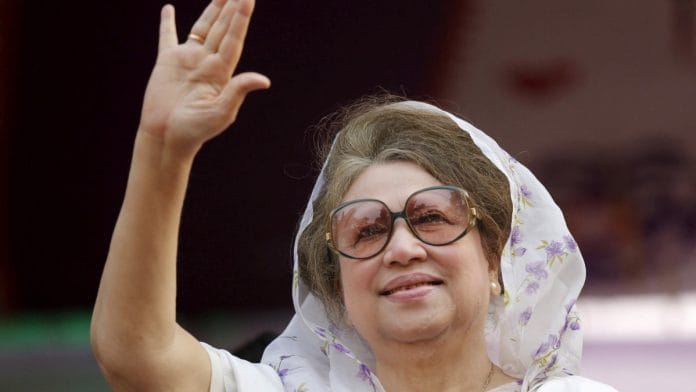New Delhi: Hours after Sheikh Hasina’s resignation as prime minister of Bangladesh in light of weeks of deadly protests, President Mohammed Shahabuddin announced Monday that jailed former prime minister Khaleda Zia, Hasina’s political opponent, was to be released.
It was “unanimously decided” to free Zia in a meeting the president held with army chief General Waker-Uz-Zaman, top officials of the navy and air force, and representatives from opposition parties including Zia’s Bangladesh Nationalist Party (BNP) and the Jamaat-e-Islami. The 78-year-old was handed a 17-year sentence for corruption in 2018. She has largely been confined to a hospital, however, owing to chronic illnesses.
Zia first entered politics after the assassination of her husband Ziaur Rahman, a former president and founder of the BNP. She took over the party’s reins in 1982, eventually leading the BNP to a decisive victory in the 1991 general elections, which marked the end of military rule. She became the first woman prime minister of the country and only the second Muslim woman to head a government after Benazir Bhutto in Pakistan.
Under her first term, she continued her husband’s policy of economic liberalisation and tried to address the country’s severe economic issues by privatising industries and promoting private investment. Her government also focused on improving the education system and expanding economic opportunities for women. She introduced compulsory free primary education, free education for girls up to 10th grade, a stipend programme for female students, and food-for-education initiatives. Additionally, the age limit for entry into government services was raised to 30 years from 27, and the education sector received its highest-ever budgetary allocation.
Zia also focused on the Ministry of Women’s Affairs, ensuring the recruitment of women across government sectors. She promoted financial empowerment for women by creating employment opportunities in agriculture and encouraging banks to provide loans to women.
In the 1996 elections, she won again. However, the result was considered controversial, with a significant portion of people abstaining from voting due to a boycott by the Opposition. Following widespread strikes and protests, Zia resigned a month later.
In 2001, Zia secured a landslide victory, but her tenure was marred by allegations of corruption. According to the Corruption Perceptions Index, published by the NGO Transparency International, Bangladesh was ranked the most corrupt country globally during this period. In 2006, Zia and her two sons faced corruption allegations from a caretaker government.
The former prime minister and her supporters have denied the charges, alleging that her trial and 2018 conviction were politically motivated to weaken the BNP and prevent her from contesting future elections. Her conviction barred her from contesting the 2019 elections. Her popularity, however, remained, with thousands protesting her conviction. In March 2020, she was released from prison temporarily while undergoing medical treatment.
Khaleda and Hasina, the two women who ruled Bangladesh
As the chief of the main opposition party, Zia posed a formidable rival to Hasina and her Awami League. The rivalry between the two had become a defining aspect of Bangladeshi politics and was often referred to as the “Battle of the Begums”.
For 31 of the past 33 years, Bangladesh has been governed by the two women leaders. They alternated in power between 1991 and 2006, with caretaker governments installed before each election. Despite this, women’s overall participation in politics remains low. In the 2018 general elections, women comprised only 3.67 percent of the candidates.
In 2014, the BNP boycotted the general elections, allowing Hasina to dominate the political scene for another five years. Zia has accused Hasina of “selling out” Bangladesh to India to remain in power, alleging that “Hasina dreams of remaining in power for life”.
Surprisingly, the two leaders once banded together in the years when the military ruled Bangladesh, playing a crucial role in the country’s struggle for democratic governance. In 1988, amid widespread protests against then president Hussain Muhammad Ershad, Hasina’s Awami League and the BNP under Zia joined forces to call for his removal. The pressure campaign was a significant part of the popular uprising against Ershad in 1990.
Despite orders to free her, Zia’s advanced age and various illnesses have raised concerns over her ability to engage in active politics. On Monday, she appealed to the people of Bangladesh to stay calm amid the unrest.
The situation in Bangladesh
The unrest in Bangladesh began nearly two months ago with students demanding the scrapping of a 30 percent quota for descendants of those who fought in the 1971 Liberation War. Nearly 300 people have been killed in clashes between the protesters on the one hand and police and government supporters on the other. Hasina was forced to resign and she fled the country as protesters stormed her residence and Parliament, ransacking looting and vandalising the buildings.
In response, an interim government is being established by the military with Nobel laureate Muhammad Yunus proposed as an adviser. Yunus, known for his pioneering work in microfinance and founding the Grameen Bank, is expected to guide the country through this crisis. The president has promised to hold an election as soon as possible.
(Edited by Sanya Mathur)
Also read: Nobel laureate Muhammad Yunus agrees to be chief adviser to interim govt, reports Bangladeshi media






